Related Research Articles
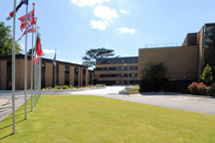
The European Centre for Medium-Range Weather Forecasts (ECMWF) is an independent intergovernmental organisation supported by most of the nations of Europe and is based at Shinfield Park, Reading, United Kingdom. It operates one of the largest supercomputer complexes in Europe and the world's largest archive of numerical weather prediction data.

Climatology or climate science is the scientific study of climate, scientifically defined as weather conditions averaged over a period of time. This modern field of study is regarded as a branch of the atmospheric sciences and a subfield of physical geography, which is one of the Earth sciences. Climatology now includes aspects of oceanography and biogeochemistry.

The Met Office Hadley Centre — named in honour of George Hadley — is one of the United Kingdom's leading centres for the study of scientific issues associated with climate change. It is part of, and based at the headquarters of the Met Office in Exeter.

Roger A. Pielke Sr. is an American meteorologist with interests in climate variability and climate change, environmental vulnerability, numerical modeling, atmospheric dynamics, land/ocean – atmosphere interactions, and large eddy/turbulent boundary layer modeling. He particularly focuses on mesoscale weather and climate processes but also investigates on the global, regional, and microscale. Pielke is an ISI Highly Cited Researcher.
The Bureau of Meteorology is an Executive Agency of the Australian Government responsible for providing weather services to Australia and surrounding areas. It was established in 1906 under the Meteorology Act, and brought together the state meteorological services that existed before then. The states officially transferred their weather recording responsibilities to the Bureau of Meteorology on 1 January 1908.
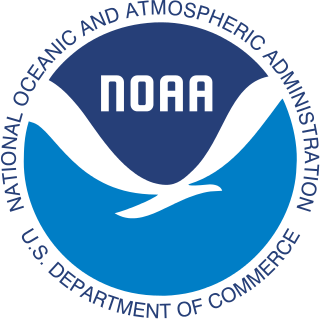
Oceanic and Atmospheric Research (OAR) is a division of the National Oceanic and Atmospheric Administration (NOAA). OAR is also referred to as NOAA Research.
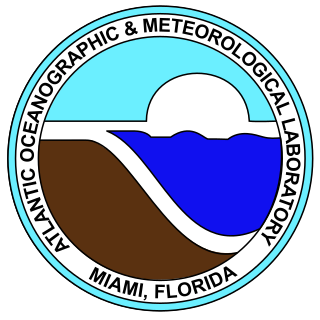
The Atlantic Oceanographic and Meteorological Laboratory (AOML), a federal research laboratory, is part of National Oceanic and Atmospheric Administration's (NOAA) Office of Oceanic and Atmospheric Research (OAR), located in Miami, Florida. AOML's research spans tropical cyclone and hurricanes, coastal ecosystems, oceans and human health, climate studies, global carbon systems, and ocean observations. It is one of seven NOAA Research Laboratories (RLs).
The India Meteorological Department (IMD) is an agency of the Ministry of Earth Sciences of the Government of India. It is the principal agency responsible for meteorological observations, weather forecasting and seismology. IMD is headquartered in Delhi and operates hundreds of observation stations across India and Antarctica. Regional offices are at Chennai, Mumbai, Kolkata, Nagpur, Guwahati and New Delhi.

The Royal Dutch Meteorological Institute is the Dutch national weather forecasting service, which has its headquarters in De Bilt, in the province of Utrecht, Netherlands.
Tropical cyclone seasonal forecasting is the process of predicting the number of tropical cyclones in one of the world's seven tropical cyclone basins during a particular tropical cyclone season. In the north Atlantic Ocean, one of the most widely publicized annual predictions comes from the Tropical Meteorology Project at Colorado State University. These reports are written by Philip J. Klotzbach and William M. Gray.
William R. Cotton is an American cloud physicist and mesoscale meteorology educator. He is a professor in the Department of Atmospheric Science at the Colorado State University (CSU).

Jagadish Shukla is an Indian meteorologist and Distinguished University Professor at George Mason University in the United States.

Dame Julia Mary Slingo, is a British meteorologist and climate scientist. She has been the Chief Scientist at the Met Office since 2009. She is also a Visiting Professor in the Department of Meteorology at the University of Reading, where she held, prior to appointment to the Met Office, the positions of Director of Climate Research in the Natural Environment Research Council (NERC) National Centre for Atmospheric Science and founding Director of the Walker Institute for Climate System Research.

The Tuvalu Meteorological Service (TMS) is the principal meteorological observatory of Tuvalu and is responsible for providing weather services to the islands of Tuvalu. A meteorological office was established on Funafuti at the time the islands of Tuvalu were administered as parts of the Gilbert and Ellice Islands colony of the United Kingdom. The meteorological office is now an agency of the government of Tuvalu.
Julie Michelle Arblaster is an Australian scientist. She is a Professor in the School of Earth, Atmosphere and Environment at Monash University. She was a contributing author on reports for which the Intergovernmental Panel on Climate Change (IPCC) was a co-recipient of the 2007 Nobel Peace Prize. Arblaster was a lead author on Chapter 12 of the IPCC Working Group I contribution to the IPCC Fifth Assessment Report in 2013. She has received the 2014 Anton Hales Medal for research in earth sciences from the Australian Academy of Science, and the 2017 Priestley Medal from the Australian Meteorological and Oceanographic Society. She has been ranked as one of the Top Influential Earth Scientists of 2010-2020, based on citations and discussion of her work.
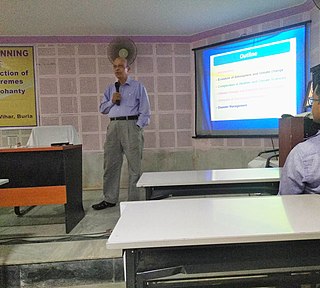
Uma Charan Mohanty is an Indian meteorologist and an emeritus professor at the School of Earth, Ocean and Climate Sciences of the Indian Institute of Technology, Bhubaneswar. He is the president of Odisha Bigyan Academy and is known for his researches on the Indian summer monsoon. Besides being an elected fellow of the Indian Geophysical Union, he is also an elected fellow of all the three major Indian science academies viz. Indian National Science Academy, Indian Academy of Sciences, and the National Academy of Sciences, India. The Council of Scientific and Industrial Research, the apex agency of the Government of India for scientific research, awarded him the Shanti Swarup Bhatnagar Prize for Science and Technology, one of the highest Indian science awards, for his contributions to Earth, Atmosphere, Ocean and Planetary Sciences in 1993.
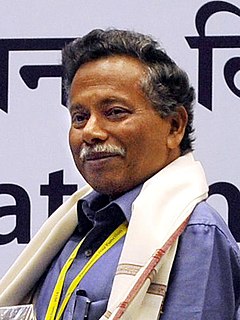
Bhupendra Nath Goswami is an Indian meteorologist, climatologist, a former director of the Indian Institute of Tropical Meteorology (IITM). and a Pisharoty Chair Professor at the Indian Institute of Science Education and Research. He is known for his researches on the Indian monsoon dynamics and is an elected fellow of all the three major Indian science academies viz. Indian National Science Academy, Indian Academy of Sciences, and the National Academy of Sciences, India as well as The World Academy of Sciences. The Council of Scientific and Industrial Research, the apex agency of the Government of India for scientific research, awarded him the Shanti Swarup Bhatnagar Prize for Science and Technology, one of the highest Indian science awards for his contributions to Earth, Atmosphere, Ocean and Planetary Sciences in 1995.
Prashant Goswami is an Indian computational geoscientist, climatologist and the director of the National Institute of Science, Technology and Development Studies, New Delhi. He is a former scientist at the Fourth Paradigm Institute and is known for his studies on the tropical atmospheric variability across the time scales. The Council of Scientific and Industrial Research, the apex agency of the Government of India for scientific research, awarded him the Shanti Swarup Bhatnagar Prize for Science and Technology, one of the highest Indian science awards for his contributions to Earth, Atmosphere, Ocean and Planetary Sciences in 2001.

Peter John Webster is a meteorologist and climate dynamicist relating to the dynamics of large-scale coupled ocean-atmosphere systems of the tropics, notably the Asian monsoon. Webster holds degrees in applied physics, mathematics and meteorology. Webster studies the basic dynamics of the coupled ocean-atmosphere system in the tropics and has applied this basic knowledge to developing warning systems for extreme weather events in Asia. He has served on a number of prestigious national and international committees including the World Climate Research Program’s Joint Scientific Committee (1983-1987), chaired the international Tropical Ocean Global Atmospheric (TOGA) organizing committee (1988-94) and was co-organizer of the multinational TOGA Couple Ocean-Atmosphere (1993). He is Emeritus Professor in Earth and Atmospheric Sciences at Georgia Institute of Technology and co-founder and Chief Scientist of Climate Forecast Applications Network LLC, a weather and climate services company.
References
- 1 2 3 "Winner's resolve forged by a blistering drought". Bureau of Meteorology (Australia). Archived from the original on 2011-06-05. Retrieved 2009-08-26.CS1 maint: discouraged parameter (link)
- ↑ Our hot, dry future